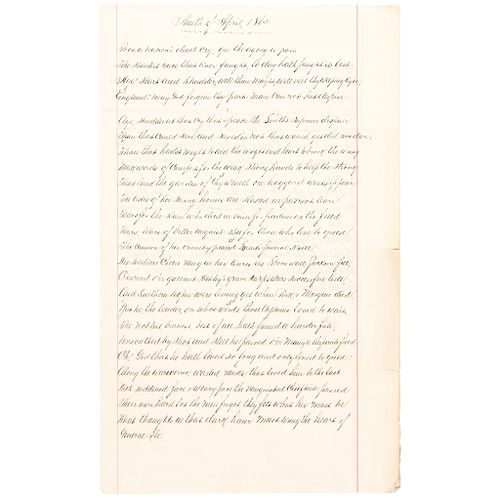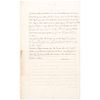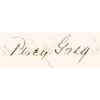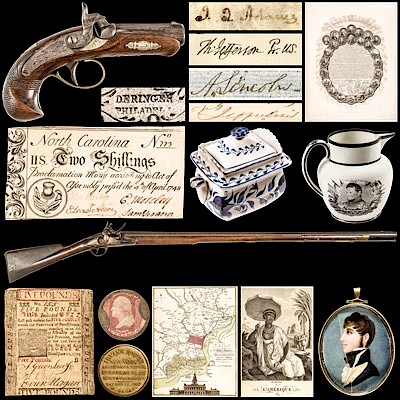Original Handwritten Poem, Ninth of April 1865, by Percy Greg, End of Civil War!
Lot 41
Categories
Estimate:
$5,000 - $6,000
Absentee vs Live bid
Two ways to bid:
- Leave a max absentee bid and the platform will bid on your behalf up to your maximum bid during the live auction.
- Bid live during the auction and your bids will be submitted real-time to the auctioneer.
Bid Increments
| Price | Bid Increment |
|---|---|
| $0 | $10 |
| $200 | $20 |
| $300 | $25 |
| $500 | $50 |
| $1,000 | $100 |
| $2,000 | $200 |
| $3,000 | $250 |
| $5,000 | $500 |
| $10,000 | $1,000 |
| $20,000 | $2,000 |
| $30,000 | $2,500 |
| $50,000 | $5,000 |
| $100,000 | $10,000 |
| $200,000 | $20,000 |
| $300,000 | $25,000 |
| $500,000 | $50,000 |
About Auction
By Early American History Auctions
Oct 19, 2019
Set Reminder
2019-10-19 12:00:00
2019-10-19 12:00:00
America/New_York
Bidsquare
Bidsquare : Historic Autographs-Currency-Political-Americana-Militaria-Guns
https://www.bidsquare.com/auctions/early-american-history-auctions/historic-autographs-currency-political-americana-militaria-guns-4513
326 Lots of Rare, Historic Autographs, Americana, Civil War Era, George Washington, Abraham Lincoln, Black History, Revolutionary War Era, Colonial America, Federal Period, War of 1812, Colonial Currency, Indian Peace Medals & more... Early American History Auctions auctions@earlyamerican.com
326 Lots of Rare, Historic Autographs, Americana, Civil War Era, George Washington, Abraham Lincoln, Black History, Revolutionary War Era, Colonial America, Federal Period, War of 1812, Colonial Currency, Indian Peace Medals & more... Early American History Auctions auctions@earlyamerican.com
- Lot Description
Autographs
Percy Greg Authored "Ninth of April 1865" Titled Original Handwritten End of the American Civil War Period Poem
PERCY GREG (1836-1889). English Poet and Writer who wrote about politics, but his views were violently reactionary, with his "History of the United States to the Reconstruction of the Union" (1887) said to be more of a polemic, rather than a history. His "Across the Zodiac" (1880) is an early Science Fiction novel, said to be the progenitor of the sword-and-planet genre, containing what is possibly the first instance in the English language of the word "Astronaut"!
April 9th, 1865-Dated Civil War Period, Manuscript Poem Signed, "Percy Greg" fully authored, penned and signed by the noted English Writer/Poet, "Percy Greg" titled, "Ninth of April 1865," Choice Extremely Fine. This Handwritten Original Poem is headed, "Ninth of April 1865" and it Commemorates the end of the American Civil War on that date. At Appomattox, Virginia, Confederate General Robert E. Lee that day surrendered his 28,000 troops to Union General Ulysses S. Grant, effectively ending the American Civil War. Forced to abandon the Confederate capital of Richmond, blocked from joining the surviving Confederate force in North Carolina, and harassed constantly by Union cavalry, Robert E. Lee had no other option than to surrender.
Written and penned in the hand of the famous English writer Percy Greg, and bearing his full signature upon the reverse side second page at the poem's conclusion. This Manuscript Document, 2 pages (single sheet back-to-back), measuring 13" x 8", on clean crisp wove period paper that is watermarked with "Cranes All Linen." This historic original Percy Greg Manuscript Signed Poem reads, in full:
"Ninth of April, 1865 ---
It is a nation's death-cry! Yes; the agony is past:
The stoutest race that ever fought to-day hath fought its last.
Ay: start and shudder; well thou mayst! well veil thy weeping eyes!
England, may God forgive thy part; Man cannot but despise.
Yes, shudder at that cry that speaks the South's supreme despair,
Thou that couldst save and savedst not; that wouldst and didst not dare!
Thou that hadst might to aid the right and heart to brook the wrong;
Weak words of comfort for the weak; strong hand to help the strong!
That land, the garden of thy wealth, one haggard waste appears,
The ashes of her sunny homes are slaked with patriot tears.
Tears for the slain who died in vain for freedom on the field;
Tears, tears of bitterer anguish still for those that live -- to yield.
The cannon of his country pealed Stuart's funeral knell;
Her soldiers' cheers rang in his ears as Stonewall Jackson fell.
Onward o'er gallant Ashby's grave swept War's triumphant tide,
And Southern hopes were living yet, when Polk and Morgan died.
But he, the leader on whose word those captains loved to wait,
The noblest, bravest, best of all, hath found a harder fate.
Unscathed by shot and steel he passed through many a desperate field;
O God, that he hath lived so long, and only lived -- to yield!
Along the war-worn wasted ranks that loved him to the last,
With saddened face and weary pace the vanquished chieftain passed.
Their own hard lot the men forgot; they felt what his must be;
What thoughts in that dark hour must wring the heart of General Lee.
The manly cheek with tears was wet, the stately head was bowed,
As breaking from their shattered ranks around his steed they crowd.
'I did my best for you:' 'twas all those quivering lips could say;
Ah, happy those whom death hath spared the anguish of to-day!
Weep on, Virginia! weep the lives given to thy cause in vain;
The sons who live to wear once more the Union's galling chain;
The homes whose light is quenched for aya; the graves without a stone;
The folded flag, the broken sword, the hope for ever flown.
Yet raise thy head, fair land! thy dead died bravely for the right;
The folded flag is stainless still, the broken sword is bright.
No blot is on thy record found; no treason soils thy fame:
Weep then thy dead: -- with covered head we mourn our England's shame!
(Signed) Percy Greg"
Percy Greg, like his father, wrote about politics, but his views were violently reactionary. His book, "History of the United States to the Reconstruction of the Union" (1887) can be said to be more of a polemic, rather than a history. His book "Across the Zodiac" (1880) is an early science fiction novel, said to be the progenitor of the sword-and-planet genre. For that novel, Greg created what may have been the first artistic language that was described with linguistic and grammatical terminology. It also contained what is possibly the first instance in the English language of the word "Astronaut".
The Battle of Appomattox Court House (Virginia, U.S.), fought on the morning of April 9, 1865, was one of the last battles of the American Civil War (1861-1865). It was the final engagement of Confederate States Army General-in-Chief, Robert E. Lee, and his Army of Northern Virginia before it surrendered to the Union Army / Army of the Potomac under the Commanding General of the United States, Ulysses S. Grant.
Lee, having abandoned the Confederate capital of Richmond, Virginia, after the ten-month Siege of Petersburg and Richmond, retreated west, hoping to join his army with the remaining Confederate forces in North Carolina of the Army of Tennessee under Gen. Joseph E. Johnston. Union infantry and cavalry forces under Gen. Philip Sheridan pursued and cut off the Confederates' retreat at the central Virginia village of Appomattox Court House.
Lee launched a last-ditch attack to break through the Union forces to his front, assuming the Union force consisted entirely of lightly armed cavalry. When he realized that the cavalry was now backed up by two corps of Federal infantry, he had no choice but to surrender with his further avenue of retreat and escape now cut off.
The signing of the surrender documents occurred in the parlor of the house owned by Wilmer McLean on the afternoon of April 9. On April 12, a formal ceremony of parade and the stacking of arms led by Southern Maj. Gen. John B. Gordon to Federal Brig. Gen. Joshua Chamberlain of Maine marked the disbandment of the Army of Northern Virginia with the parole of its nearly 28,000 remaining officers and men, free to return home without their major weapons but enabling men to take their horses and officers to retain their sidearms (swords and pistols), and effectively ending the war in Virginia.
This event triggered a series of subsequent surrenders across the South, in North Carolina, Alabama and finally Shreveport, Louisiana, for the Trans-Mississippi Theater in the West by June, signaling the end of the four-year-long war.
- Shipping Info
-
Early American provides in-house worldwide shipping. Please contact us directly if you have questions about your specific shipping requirements.
-
- Buyer's Premium



 EUR
EUR CAD
CAD AUD
AUD GBP
GBP MXN
MXN HKD
HKD CNY
CNY MYR
MYR SEK
SEK SGD
SGD CHF
CHF THB
THB













